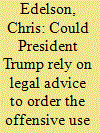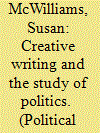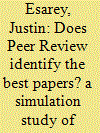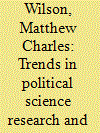|
|
|
Sort Order |
|
|
|
Items / Page
|
|
|
|
|
|
|
| Srl | Item |
| 1 |
ID:
155736


|
|
|
|
|
| Summary/Abstract |
The incongruity between traditional research standards and the realities of “big data” raises novel ethical questions for political science researchers. Data’s status as a commodity largely held by private companies only further confuses matters. Drawing on Max Weber, this article attempts to shift the current ethical discussion away from the individualistic concern for privacy toward the more collective framework of democratic values.
|
|
|
|
|
|
|
|
|
|
|
|
|
|
|
|
| 2 |
ID:
155735


|
|
|
|
|
| Summary/Abstract |
Although the US Constitution permits presidents to order the use of military force without congressional approval only in an emergency context, presidents since Truman—especially after 9/11—have unilaterally ordered the offensive use of military force without congressional approval. Unless Congress asserts its constitutional role, President Donald Trump could continue to draw on this precedent to claim broad discretion to order the use of military force.
|
|
|
|
|
|
|
|
|
|
|
|
|
|
|
|
| 3 |
ID:
155742


|
|
|
|
|
| Summary/Abstract |
Creative writing is not part of professional training in political science. Scholars in other fields, though, testify to the benefits of creative writing assignments, and my experiences teaching an undergraduate course on Politics and Literature suggest that there may be value in adding creative writing into certain political science courses. As with other forms of non-academic writing that political scientists identify as enriching, creative writing allows students to consider politics from multiple perspectives and expands their communicative powers. Working at the craft of storytelling—as opposed to abstract argumentation—can help students to think through key claims in contemporary political thought. Moreover, in this age of “alternative facts,” doing creative writing in a politics course may help students hone a critical skill of citizenship: thinking about the news in terms of narrative. In this essay, I consider the advantages and challenges of bringing creative writing into the study of politics.
|
|
|
|
|
|
|
|
|
|
|
|
|
|
|
|
| 4 |
ID:
155737


|
|
|
|
|
| Summary/Abstract |
How does the structure of the peer review process, which can vary among journals, influence the quality of papers published in a journal? This article studies multiple systems of peer review using computational simulation. I find that, under any of the systems I study, a majority of accepted papers are evaluated by an average reader as not meeting the standards of the journal. Moreover, all systems allow random chance to play a strong role in the acceptance decision. Heterogeneous reviewer and reader standards for scientific quality drive both results. A peer review system with an active editor—that is, one who uses desk rejection before review and does not rely strictly on reviewer votes to make decisions—can mitigate some of these effects.
|
|
|
|
|
|
|
|
|
|
|
|
|
|
|
|
| 5 |
ID:
155738


|
|
|
|
|
| Summary/Abstract |
Professional associations like the American Political Science Association (APSA) are intended to represent the interests of all of the members of the profession. The APSA has worked diligently to increase diversity in its leadership, successfully bringing more women and minorities into APSA governance. However, there has not been a corresponding effort to ensure that members from diverse institution types have a seat at the table. This is important because different institution types have different professional issues and interests. In this research note, I explore the extent to which APSA’s leadership is reflective of the range of institution types in higher education. I find that the APSA’s leadership is disproportionately comprised of members from large doctoral-granting universities and elite graduate programs. I conclude with potential ramifications and suggestions for further research.
|
|
|
|
|
|
|
|
|
|
|
|
|
|
|
|
| 6 |
ID:
155740


|
|
|
|
|
| Summary/Abstract |
In recent decades, instructors have increasingly adopted the use of “serious” games in their classrooms. Typically, these games take the form of role-playing simulations or wargames. However, online computer-run games have opened up new possibilities: to explore complex conceptual relationships, to utilize and display asymmetric information, to be playable anywhere and by anyone, and more. This article describes the game, Dark Networks, and shows why this type of game is valuable as well as how it has been used for pedagogical gains.
|
|
|
|
|
|
|
|
|
|
|
|
|
|
|
|
| 7 |
ID:
155741


|
|
|
|
|
| Summary/Abstract |
Human rights, ethnic conflict, democratization, colonialism, and development—many upper-level political science courses contain content that is understood differently across cultural contexts. Equipping students to appreciate diverse perspectives on these issues is a challenge that requires creative pedagogical strategies, regardless of whether all students come from the same region of the United States or the class has more than half international students. Professors in both environments have the complex task of guiding students to navigate disparate viewpoints. This article demonstrates the pedagogical potential of an integrated approach to student-led class modules based on a two-semester experiment using a Global Politics of Human Rights course at a small liberal arts college with a large population of international students. One section of the same course was taught in each semester with identical course material but with two different sets of student participants. After situating the challenges and the strategy within the growing literature on active learning, the article provides basic details of the pedagogical approach and three examples of the modules. It concludes with methods for assessing the effectiveness of student-led class modules.
|
|
|
|
|
|
|
|
|
|
|
|
|
|
|
|
| 8 |
ID:
155739


|
|
|
|
|
| Summary/Abstract |
This article illustrates major trends in political science research and frames the progress of research agendas in comparative politics. Drawing on the titles and abstracts of every article published in eight major political science journals between 1906 and 2015, the study tracks the frequency of references to specific keywords over time. The analysis corresponds to and complements extant descriptions of how the field has developed, providing evidence of three ‘revolutions’ that shaped comparative politics—the divorce of political science from history during its early years, a behavioral revolution that lasted until the late 1960s, and a second scientific revolution after 1989 characterized by greater empiricism. Understanding the development of the subdiscipline, and viewing it through the research published in political science over the last 100 years, provides useful context for teaching future comparativists and encourages scholars to think more broadly about the research traditions to which they are contributing.
|
|
|
|
|
|
|
|
|
|
|
|
|
|
|
|
|
|
|
|
|